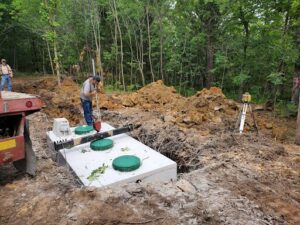
If you’re a homeowner with a septic system—especially in rural areas like Collinsville, OK—routine maintenance is not just a good idea; it’s essential. One of the most important tasks is regularly pumping your septic tank. But what actually happens if you neglect this crucial maintenance?
Let’s break down the serious problems that can arise when you don’t pump your septic tank and why staying on schedule can save you thousands in repairs, protect your property, and preserve your health.
What Does a Septic Tank Do?
A septic system is your home’s personal wastewater treatment plant. Wastewater from your toilets, sinks, showers, and appliances flows into the septic tank, where solids settle to the bottom (forming sludge), oils float to the top (forming scum), and the remaining liquid exits into a drainfield for natural filtration. Over time, the sludge builds up—and that’s where regular pumping comes in.
What Happens If You Don’t Pump It?
Failing to pump your septic tank allows solids to accumulate until they interfere with the system’s ability to function properly. Here’s what can go wrong:
1. Sewage Backups and Slow Drains
When the tank is full of sludge, wastewater can’t flow out as it should. This can cause slow-draining sinks and toilets—or worse, raw sewage backing up into your home. That’s not just unpleasant—it’s a health hazard.
2. Damage to the Drainfield
If solids escape the tank because it’s too full, they can clog the drainfield pipes. Once the drainfield is compromised, wastewater can no longer be absorbed properly, leading to soggy ground, foul smells, and costly repairs. In some cases, the entire drainfield may need to be replaced.
3. Complete System Failure
The longer you wait, the worse it gets. Ignoring your septic system for too long can lead to a complete system failure, requiring full replacement of the tank and drainfield—a massive and expensive undertaking.
4. Environmental Contamination
An overflowing or leaking septic system can pollute local groundwater, streams, and soil with harmful bacteria and chemicals. This not only damages the environment but also puts your family and community at risk.
5. Expensive Emergency Repairs
Emergency septic services cost significantly more than scheduled maintenance. In addition to the repair bill, you might also face property damage and even temporary relocation while issues are fixed.
How Often Should You Pump Your Septic Tank?
Generally, septic tanks should be pumped every 3 to 5 years. However, the right frequency depends on:
-
Tank size
-
Household size
-
Water usage habits
-
Waste disposal practices
A professional inspection can help determine the ideal pumping schedule for your system.
Warning Signs It’s Time to Pump
Watch for these red flags that indicate your septic tank needs attention:
-
Slow drains or gurgling pipes
-
Sewage odors indoors or near the drainfield
-
Standing water or overly green grass above the drainfield
-
Backups in toilets or sinks
If you notice any of these, don’t wait—call a professional right away.
Why You Should Trust a Professional
Septic tank pumping is not a DIY job. It requires specialized equipment and knowledge to do safely and effectively. A professional septic service will ensure the job is done thoroughly, reducing the risk of damage to your system or property.
Protect Your Home with T&V Backhoe & Septic Services
Don’t risk the health, safety, and value of your property by skipping septic maintenance. If you’re in Collinsville, OK, or the surrounding areas, T&V Backhoe & Septic Services is here to help.
We provide reliable, professional septic tank pumping and maintenance to keep your system running smoothly.
Need Septic Services?
📞 Call us at (918) 855-7465 or fill out our online form to schedule service.
Ensure your septic system remains in top condition with T&V Backhoe & Septic Services—your trusted local experts in Collinsville, OK.